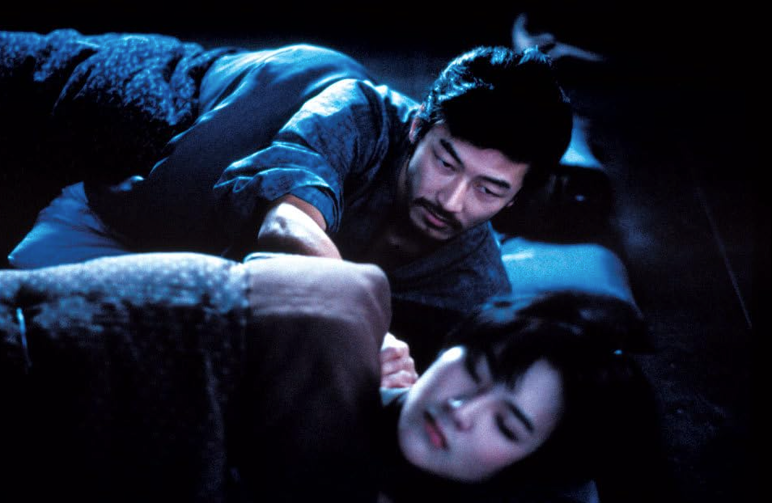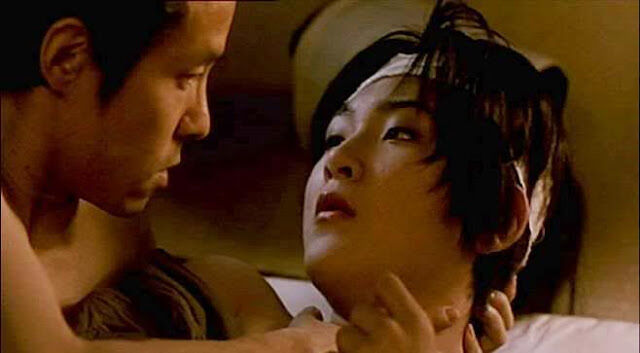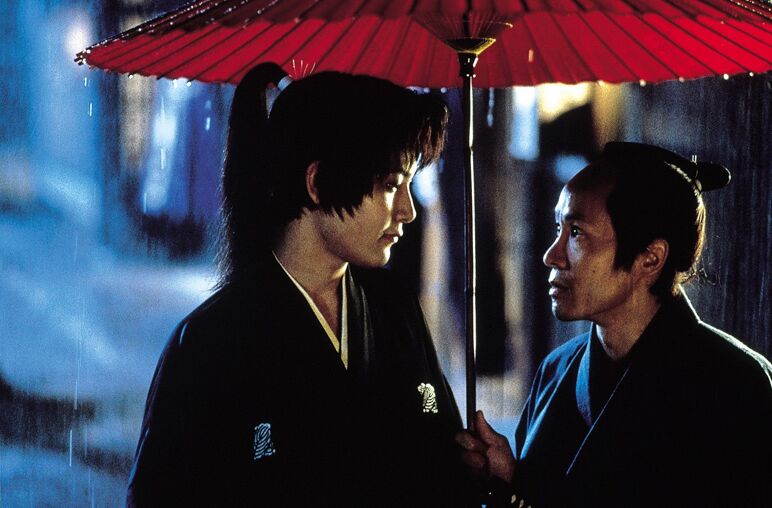

Welcome back to our queer film retrospective, “A Gay Old Time.”
As we continue our month-long Pride Around The World series, this week we take a trip to 1860s Japan with Nagisa Oshima’s Taboo, which revolves around the age-old (quite literally in this case) matter of the repressed emotions and desires that awaken among a group of men forced to be in an entrapped space with each other.
It can often seem as if there are only limited variants of the gay period piece movie. As we discussed last week with A Year Without Love and the AIDs crisis, there are plenty of rich narratives about the gay world in the second half of the last century, but the further we go back in time, the more narrow the view of queerness seems to be for mainstream (and even many independent) films.
How about we take this to the next level?
Subscribe to our newsletter for a refreshing cocktail (or mocktail) of LGBTQ+ entertainment and pop culture, served up with a side of eye-candy.
We’re all too familiar with the tropes and beats of the costume gay period piece, as seen in films like Maurice, Portrait Of A Lady On Fire, and Brideshead Revisited. Conservative and ultra mannered societal values, and tight, restrictive clothing of the era seem to be a perfect backdrop for the repressed emotions and restrained sexuality of queer characters.
However, many of these movies seem to be contained into particular eras in time; there isn’t a large catalogue of films about historically more open times, like Greco-Roman or Native cultures. And as we’ve been exploring all month, a lot of the conceptions we may have about queer period pieces have most likely come from Western, English-language media. But as evidenced by a handful of films that are able to cross over (like Chan Wook Park’s The Handmaiden) there are entire traditions of historical queerness that are waiting to be discovered.
The Set-Up
1999’s Japanese drama Taboo (also known as its original film, Gohatto) follows a young man, Kano Sozaburo (Ryuhei Matsuda), as he is admitted into the Shinsengumi, an elite group of Japanese samurais in the 1860s. He’s a very skilled fighter but almost everyone is blindsided by his otherworldly beauty and charm. Both his superiors and other students start to fight for his attention, creating chaos, tension, and confusion among the secluded group.
The film is an effective chamber thriller with espionage elements that serves as an intriguing look into how this Japanese secret organization operated, and the ripple effects that human disruption had throughout its ranks.
It’s a portrait of a very specific period in Japanese history (the Shinsengumi were only active for about six years, from 1863 to 1869) that feels simultaneously small in scope (it takes place almost entirely within the confines of the academy where these young men are trained) and comprehensive as a snapshot of Japanese culture regarding issues like masculinity, desire, gender, and homosexuality.
It’s quite astounding the degree to which Kano Sozaburo’s presence disrupts the order of both individuals in the Shinsengumi, and the organization as a whole. From the first moments, his peers are equally attracted to and jealous of him, and are certain that he is receiving unjust privileges because of his beauty. Which, in a way, he is.
In particular, Kano catches the eye of vice commander Hijikata Toshizō (Takeshi Kitano) who gives him special treatment and begins to quietly fall for him. Kano begins havign affairs with several men in the group, all while at the same time trying to prove his worth as a fighter.
Fighting Temptation


To our eyes in 2025, some elements about the sexual politics of the movie and the time period it depicts may seem strange. The generals and other students openly lust after Kano Sozaburo, make overt advances, and some even sleep with him. However, they also seem to still be othering those with same-sex attraction. Once it is made known that some of them pine after and have been with Kano, they become socially ostracized from the rest.
There is a refreshing openness with which these men give into their desires and feelings in an all-male, military setting, especially since so many Western films about queerness in the military explicitly revolve around the brutality that stems from the combination of repressed sexuality and toxic masculinity.
That doesn’t seem to be the case with Taboo. But there are still a lot of social codes, labels of sexual identification, and assumed behaviors that come into play with the character dynamics, most of which are probably unknown to the untrained eye, and would need a separate piece to explain and deconstruct.
But even as we may not completely understand the unspoken rules of its time and culture, there’s an unmistakable sense that this is a different kind of sexual freedom than we are used to seeing, particularly in gay pieces set before the 1900s.
A Blast From The Past


There is an uncanny modernity in the idea that Kano Sozaburo does not want to succeed just because he is desired by others; he wants to prove his worth and merit. People above him keep promising him an easier path if he gives in to their advances, his peers openly begrudge him for the advantages that his good looks give him while also pining for him, and Kano is torn between whether to use his sexuality to his own advantage or not.
To remove this story from its particular time and place would be an incredible disservice, as it would lose the very thing that makes it stand out. However, it’s hard not to see the thematic parallels to modern gay culture, in which people with good looks and an overt sexuality seem to have a social leg up, and the simultaneous bitterness, jealousy, and desire that this brings up on people around them.
Because of this, Taboo feels like a surprisingly modern movie, even if we are half a century removed from its release, and more than 150 years from when it is set. It’s a great example of how cinema has only begun to scratch the surface when it comes to telling queer stories set in a distant past, but also how these stories can have incredibly resonant themes to today’s world and society.
Though Taboo is not currently streaming through any official channels, it can be found in full online through sources like the Internet Archive.
Related*

Sign up for the Queerty newsletter to stay on top of the hottest stories in LGBTQ+ entertainment, politics, and culture.








